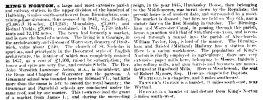Peter Faulkner
knowlegable brummie
I'm hoping someone can help with two questions relating to my 10th great grandfather Francis Potter, who was born probably in the 1570s and died in 1634 in Kings Norton. His will in 1634 named him as a vintner (and something else... which is my second question below!). In Quarter Sessions in 1631 he was referred to as a vintner and "licensed to keep a common alehouse". Quarter sessions in 1620 referred to him as a Yeoman, and sessions in 1609 called for his "appearance to answer for selling ale without a license".
I'm wondering if it is possible to identify which establishment he owned or rented at that time. I can't find online which pubs and inns were around in Kings Norton in the early 1600s (although I understand both the Saracen's Head and the Ship Inn then known as the Anchor existed in the 1650s). Of course, as an alehouse keeper, it may not have even had a name - those others are inns which I believe were more "upmarket" than an alehouse. Does anyone have any idea how I could identify where Francis Potter served ale?
My second question relates to his will. It seems to say "I, Francis Potter of Kings Norton in the county of Worcester, jupolder and vintener, ..." but I have no idea what a "jupolder" is or even if I am reading the handwriting correctly. Comparing letters to other similar ones in the will it certainly looks like "jupolder". Here is an image of it; any observations would be greatly appreciated:

Thanks,
Peter
I'm wondering if it is possible to identify which establishment he owned or rented at that time. I can't find online which pubs and inns were around in Kings Norton in the early 1600s (although I understand both the Saracen's Head and the Ship Inn then known as the Anchor existed in the 1650s). Of course, as an alehouse keeper, it may not have even had a name - those others are inns which I believe were more "upmarket" than an alehouse. Does anyone have any idea how I could identify where Francis Potter served ale?
My second question relates to his will. It seems to say "I, Francis Potter of Kings Norton in the county of Worcester, jupolder and vintener, ..." but I have no idea what a "jupolder" is or even if I am reading the handwriting correctly. Comparing letters to other similar ones in the will it certainly looks like "jupolder". Here is an image of it; any observations would be greatly appreciated:

Thanks,
Peter






